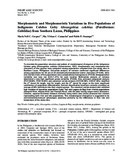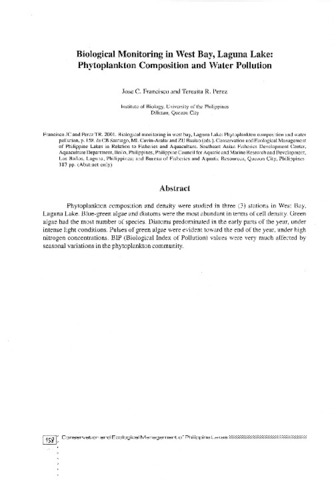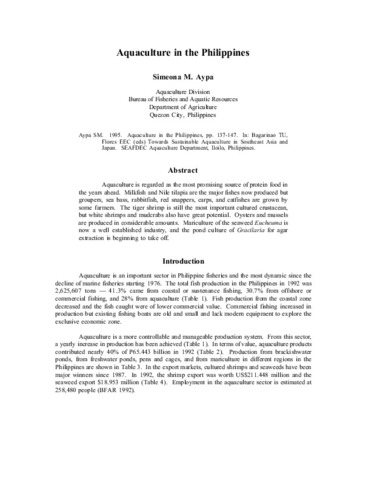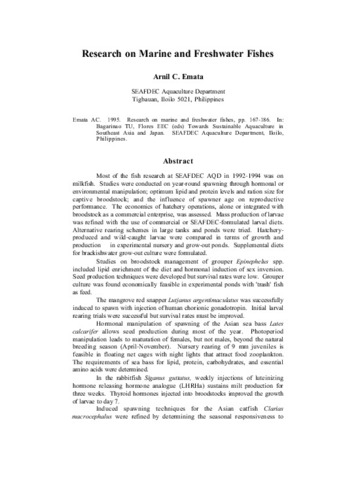Morphometric and morphomeristic variations in five populations of indigenous Celebes goby Glossogobius celebius (Perciformes: Gobiidae) from Southern Luzon, Philippines
Share
Abstract
To elucidate the population structure and pattern of morphological divergence of the indigenous Celebes goby Glossogobius celebius (Valenciennes, 1837), morphometric and morphomeristic characters of this species were compared among populations collected from five study sites in Southern Luzon, Philippines. Univariate analysis of variance confirmed significant differences among populations for 20 out of 23 allometrically-transformed metric characters (P<0.05), while nine meristic traits of five populations were comparatively homogeneous (P>0.05). Intrapopulation variability was very low (6.81-7.21%) for each location. Multivariate analysis of variance determined a very high significant group variability (P<0.05). Also, principal component analysis (PC1=36.60%; PC2=18.34%) and canonical variate analysis (CV1=44.59%; CV2=37.30%) identified the 2 super(nd) dorsal fin length, anal fin length, and the 2 super(nd) dorsal fin origin as the main significant contributors of population differentiation. Derived classification functions correctly classified an average of 68% individuals into their original groups. The canonical variate analysis plot exhibited high isolation of lacustrine populations (Lake Taal and Laguna de Bay) from riverine populations (Dampalit River, Alitaaw River and Pansipit River), with the latter having longer metric characters. Likewise, squared Euclidean distance similarity using metric data clearly produced two clusters representing both river and lake populations. This morphological divergence is suggested to be environmentally-induced (phenotypic plasticity) primarily by the differences in flow rate and temperature of the study sites.
Suggested Citation
Corpuz, M. N. C., Camacho, M. V. C., & Ocampo, P. P. (2013). Morphometric and morphomeristic variations in five populations of indigenous Celebes goby Glossogobius celebius (Perciformes: Gobiidae) from Southern Luzon, Philippines. Philippine Agricultural Scientist , 96(1), 75-85. http://hdl.handle.net/10862/2232
Subject
animal morphology  ; animal population
; animal population  ; endemic species
; endemic species  ; freshwater fishes
; freshwater fishes  ; freshwater lakes
; freshwater lakes  ; meristic counts
; meristic counts  ; phenotypic variation
; phenotypic variation  ; population structure
; population structure  ; rivers
; rivers  ; Philippines, Luzon I., Alitaaw R.; Philippines, Luzon I., Dampalit R.; Philippines, Luzon I., Laguna de Bay L.; Philippines, Luzon I., Pansipit R.; Philippines, Luzon I., Taal L.
; Philippines, Luzon I., Alitaaw R.; Philippines, Luzon I., Dampalit R.; Philippines, Luzon I., Laguna de Bay L.; Philippines, Luzon I., Pansipit R.; Philippines, Luzon I., Taal L.
 ; animal population
; animal population  ; endemic species
; endemic species  ; freshwater fishes
; freshwater fishes  ; freshwater lakes
; freshwater lakes  ; meristic counts
; meristic counts  ; phenotypic variation
; phenotypic variation  ; population structure
; population structure  ; rivers
; rivers  ; Philippines, Luzon I., Alitaaw R.; Philippines, Luzon I., Dampalit R.; Philippines, Luzon I., Laguna de Bay L.; Philippines, Luzon I., Pansipit R.; Philippines, Luzon I., Taal L.
; Philippines, Luzon I., Alitaaw R.; Philippines, Luzon I., Dampalit R.; Philippines, Luzon I., Laguna de Bay L.; Philippines, Luzon I., Pansipit R.; Philippines, Luzon I., Taal L.
Taxonomic term
Collections
- AQD Journal Articles [1248]
Related items
Showing items related by title, author, creator and subject.
-
Biological monitoring in west bay, Laguna Lake: Phytoplankton composition and water pollution
Francisco, Jose C.; Perez, Teresita R. (Aquaculture Department, Southeast Asian Fisheries Development Center; Philippine Council for Aquatic and Marine Research and Development (PCAMRD), Department of Science and Technology; Bureau of Fisheries and Aquatic Resources, 2001)Phytoplankton composition and density were studied in three (3) stations in West Bay, Laguna Lake. Blue-green algae and diatoms were the most abundant in terms of cell density. Green algae had the most number of species. ... -
Aquaculture in the Philippines
Aypa, Simeona M. (Aquaculture Department, Southeast Asian Fisheries Development Center, 1995)Aquaculture is regarded as the most promising source of protein food in the years ahead. Milkfish and Nile tilapia are the major fishes now produced but groupers, sea bass, rabbitfish, red snappers, carps, and catfishes ... -
Research on marine and freshwater fishes
Emata, Arnil C. (Aquaculture Department, Southeast Asian Fisheries Development Center, 1995)Most of the fish research at SEAFDEC AQD in 1992-1994 was on milkfish. Studies were conducted on year-round spawning through hormonal or environmental manipulation; optimum lipid and protein levels and ration size for ...





